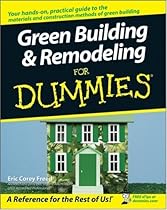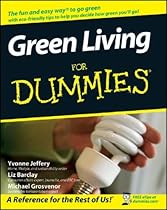See all "regreening" stories.
by Broderick Perkins
© 2008 DeadlineNews.Com
Deadline Newsroom - It makes good sense to go green when you make home improvements and renovate your home.
Green remodeling, dubbed "regreening," includes design and construction that reduces the environmental impact of the work itself. That includes the impact on energy, water, and materials consumption; waste generation; and harmful emissions -- indoors and out -- according to the U.S. Green Building Council (USGBC).
The council also says a green home is one that uses less energy, water and natural resources; creates less waste, and is healthier for the people who live there.
If being politically correct isn't enough to make you see green, with today's attention to global warming, consider this: regreening can also increase the amount of green backs you get when you sell your home.
But how can you be sure the green approach you use is the best green you can find for your home improvement?
To assist homeowners who want to cultivate a green home improvement lifestyle the American Society of Interior Designers (ASID) and the USGBC have teamed up to create Regreen, a resource for green home renovation best practices and guidelines.

ASID is a community of designers, industry representatives, educators, and students committed to interior design. USGBC is coordinating the establishment and evolution of a national consensus to provide the industry with the tools necessary to design, build, and operate buildings that deliver high performance inside and out. It's also a leading organization representing the building industry on environmental building matters.
The partnership says to get true green, begin with these tips.
Consider composition. When choosing a green product, consider the raw materials used to create the product and their origin. For example, some composite decking manufacturers use recovered wood fibers and recycled plastic grocery bags, milk jugs and detergent bottles to create their materials. Products using recycled rather than virgin materials help by creating less waste, by keeping materials out of landfills and by reducing the need for costly raw materials like petroleum.
By comparison, decking products made polyvinyl chloride (PVC) come with the promise of lower maintenance, however the material is problematic.
"PVC is the worst plastic from an environmental health perspective, posing unique and major hazards in its manufacture, product life and disposal," according to The Healthy Building Network. The network also says PVC poses unique and significant risks in its production, product life and disposal, and defies the greater desire for a healthy environment and improved quality of life.
Consider a product's life cycle. To reduce environmental impact, seek long-lasting products that also can be repurposed or recycled at the end of their life. Some can even be returned to the manufacturer to be recycled into future products.

Consider sustainability. Products should also have the ability to be maintained sustainably. For building products that will be used outdoors, look for durable products that can withstand the regional climate over an extended period. Sustainability should also be practiced by the manufacturer and during the production process. Manufacturing processes can use a great deal of energy and resources, as well as release toxic chemicals and gases. Look for sustainable companies that have implemented environmental processes and procedures to reduce emissions and energy, as well as reduce the amount of waste through recycling, reusing and other environmentally responsible practices.
Consider value. While green home improvements are inherently good for your home's value, ensure you'll get the most from your regreening by looking for a life-cycle cost analysis of green products. The analysis calculates the approximate maintenance cost over its lifetime compared to the initial product price.
For more information, download Regreen ASID & USGBC Residential Remodeling Guidelines, check out USGBC's Green Home Renovations, visit Healthy Building Network's Web site and see Consumer Reports' GreenerChoices.org.
• DeadlineNews.Com offers more green news that hits home.
• DeadlineNews.Com offers more global warming news that hits home.
© 2008 DeadlineNews.Com
Get news that really hits home for your Web site or blog from DeadlineNews.Com.
Broderick Perkins, an award-winning consumer journalist of 30 years, is publisher and executive editor of San Jose, CA-based DeadlineNews.Com, a real estate news and consulting service, and the new Deadline Newsroom, DeadlineNews.Com's new backshop. In both cases, it's where all the news really hits home.
DeadlineNews.Com's Editorial Content Is Intellectual Property • Unauthorized Use Is A Federal Crime



No comments:
Post a Comment